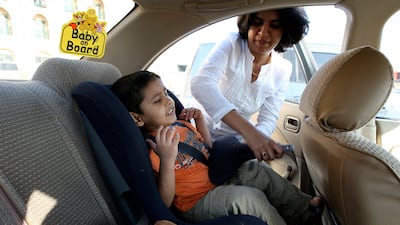Two in five parents in the UAE do not ensure their children are buckled up safely in vehicles before a journey, a survey has found.
The poll carried out by Volkswagen Middle East, RoadSafetyUAE and market research agency YouGov found 40 per cent of parents do not fasten their children safely. A common reason is that the youngsters do not like being strapped in.
More than 1,000 people, including 550 parents, were surveyed for the nationwide road safety campaign.
Thirty-four per cent of parents said they did not have a child seat, while 29 per cent said they felt they drove safely and did not feel the need to strap their child into a car seat.
Every person in a vehicle is legally required to wear a seat belt at all times, regardless of age, and a child under 4 must travel in a child seat.
Driver who fail to ensure this happens can be fined Dh400 ($108) and receive four black points on their licence.
“Traffic rules, fines and black points have been put in place to reduce accidents and deaths. We not only issue fines but also educate drivers. However, the real and biggest responsibility is that of the driver,” Capt Saud Al Shaiba, director of traffic awareness branch at Sharjah Police, told The National.
“It is the driver’s responsibility to adhere to the rules to ensure zero accidents.
“Sudden swerving, failing to stay in lane, speeding or any traffic offence a driver commits can cause an accident.
“Wearing a seat belt will certainly minimise the risks to drivers or passengers. They will not smash into the windshield or get thrown out of the car.
“Committing to children’s safety in cars by not letting them sit in the front seats and by ensuring they are in suitable child car seats and buckled up is the way to keep them safe."
The survey showed 84 per cent of respondents experienced anxiety or stress when driving, and 82 per cent said they would drive more safely if they left for their destination 10 minutes earlier.
Stress levels were higher among female drivers and in the 35 to 44 age group. Only 16 per cent of drivers said they were never affected by anxiety or stress on the road.

Half of respondents said listening to calming music, the radio or podcasts helped them overcome anxiety.
Breathing techniques and speaking over the phone or with passengers helped to reduce stress levels.
"Good emotional regulation skills and healthy mental health practices are fundamental for safe driving," said Dr Saliha Afridi, clinical psychologist and managing director of The LightHouse Arabia.
“Whether it's lingering feelings from a negative interaction or anger associated with something that happens on the road, having the ability to regulate your emotions, calm yourself down quickly, and not being emotionally reactive is essential for a safe drive."
Twenty-three per cent of respondents said they were more likely to speed when running late, while 18 per cent said they would tailgate.
Fifty-seven per cent said that they would be less stressed if they began their journeys a few minutes earlier.
The findings come after authorities ran safe back-to-school campaigns for the new academic year.
In August, Dubai Police told drivers to follow traffic rules and avoid speeding as thousands of pupils returned to classrooms.
Police also posted educational videos on social media to raise awareness.
Similar awareness campaigns were run in Abu Dhabi.




